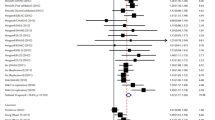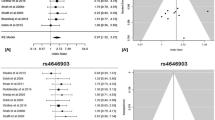Abstract
Conflicting results were implicated in both single case-control studies and meta-analyses of the correlation between p73 G4C14-to-A4T14 polymorphism and lung cancer risk. We designed this study to further assess the association by meta-analysis. A meta-analysis was performed based on five case-control studies (5,467 subjects) retrieved from PubMed and Embase. Odds ratios (ORs) with 95 % confidence intervals (CIs) were measured for the association using the models of random effects and fixed effects. The results showed no evidence between p73 G4C14-to-A4T14 polymorphism and lung cancer risk in any genetic model (allele model: OR, 1.06, 95 % CI, 0.89–1.26; homozygote genotypes: OR, 1.18, 95 % CI, 0.80–1.73; heterozygote genotypes: OR, 1.04, 95 % CI, 0.89–1.23; dominant model: OR, 1.05, 95 % CI, 0.89–1.24; recessive model: OR, 1.17, 95 % CI, 0.93–1.47). Subgroup analyses according to ethnicity, however, detected significant association in Caucasian population. Our study provides evidence that p73 G4C14-to-A4T14 polymorphism may play a major role in susceptibility to lung cancer in Caucasians.



Similar content being viewed by others
References
Hsu NY et al. Lung cancer susceptibility and genetic polymorphism of DNA repair gene XRCC4 in Taiwan. Cancer Biomark. 2009;5(4):159–65.
Arslan S, Pinarbasi H, Silig Y. Myeloperoxidase G-463A polymorphism and risk of lung and prostate cancer in a Turkish population. Mol Med Rep. 2011;4(1):87–92.
Pavanello S et al. Role of CYP1A2 polymorphisms on lung cancer risk in a prospective study. Cancer Genet. 2012;205(6):278–84.
Zhang Y et al. Association between polymorphisms in COMT, PLCH1, and CYP17A1, and non-small-cell lung cancer risk in Chinese nonsmokers. Clin Lung Cancer. 2013;14(1):45–9.
Robles AI, Harris CC. p53-mediated apoptosis and genomic instability diseases. Acta Oncol. 2001;40(6):696–701.
Melino G et al. Functional regulation of p73 and p63: development and cancer. Trends Biochem Sci. 2003;28(12):663–70.
Wang XQ et al. A possible role of p73 on the modulation of p53 level through MDM2. Cancer Res. 2001;61(4):1598–603.
Kaghad M et al. Monoallelically expressed gene related to p53 at 1p36, a region frequently deleted in neuroblastoma and other human cancers. Cell. 1997;90(4):809–19.
Davis, P.K., and Dowdy, S. F., p73. Int. J. Biochem. Cell Biol., 2001. 33: p. 935.
Nomoto S et al. Search for mutations and examination of allelic expression imbalance of the p73 gene at 1p36.33 in human lung cancers. Cancer Res. 1998;58(7):1380–3.
Ikawa S, Nakagawara A, Ikawa Y. p53 family genes: structural comparison, expression and mutation. Cell Death Differ. 1999;6(12):1154–61.
Ibrahim N et al. BRCA1-associated epigenetic regulation of p73 mediates an effector pathway for chemosensitivity in ovarian carcinoma. Cancer Res. 2010;70(18):7155–65.
Moll UM, Erster S, Zaika A. p53, p63 and p73–solos, alliances and feuds among family members. Biochim Biophys Acta. 2001;1552(2):47–59.
Marabese M, Vikhanskaya F, Broggini M. p73: a chiaroscuro gene in cancer. Eur J Cancer. 2007;43(9):1361–72.
Daskalos A et al. Global DNA hypomethylation-induced DeltaNp73 transcriptional activation in non-small cell lung cancer. Cancer Lett. 2011;300(1):79–86.
Ryan BM et al. A common p73 polymorphism is associated with a reduced incidence of oesophageal carcinoma. Br J Cancer. 2001;85(10):1499–503.
Peters MA et al. Germline mutations in the p73 gene do not predispose to familial prostate-brain cancer. Prostate. 2001;48(4):292–6.
Li G et al. p73 G4C14-to-A4T14 polymorphism and risk of lung cancer. Cancer Res. 2004;64(19):6863–6.
Zhang X et al. The p73 G4C14-to-A4T14 polymorphism is associated with risk of lung cancer in the Han nationality of North China. Mol Carcinog. 2013;52(5):387–91.
Hiraki A et al. Different risk relations with smoking for non-small-cell lung cancer: comparison of TP53 and TP73 genotypes. Asian Pac J Cancer Prev. 2003;4(2):107–12.
Mantel N, Haenszel W. Statistical aspects of the analysis of data from retrospective studies of disease. J Natl Cancer Inst. 1959;22(4):719–48.
DerSimonian R, Laird N. Meta-analysis in clinical trials. Control Clin Trials. 1986;7(3):177–88.
Egger M et al. Bias in meta-analysis detected by a simple, graphical test. BMJ. 1997;315(7109):629–34.
Choi JE et al. No association between p73 G4C14-to-A4T14 polymorphism and the risk of lung cancer in a Korean population. Biochem Genet. 2006;44(11–12):543–50.
Schabath MB et al. Combined effects of the p53 and p73 polymorphisms on lung cancer risk. Cancer Epidemiol Biomarkers Prev. 2006;15(1):158–61.
Yuan P et al. Association of the responsiveness of advanced non-small cell lung cancer to platinum-based chemotherapy with p53 and p73 polymorphisms]. Zhonghua Zhong Liu Za Zhi. 2006;28(2):107–10.
Liu L et al. Combined effect of genetic polymorphisms in P53, P73, and MDM2 on non-small cell lung cancer survival. J Thorac Oncol. 2011;6(11):1793–800.
Hu Z et al. Dinucleotide polymorphism of p73 gene is associated with a reduced risk of lung cancer in a Chinese population. Int J Cancer. 2005;114(3):455–60.
Jun HJ et al. Combined effects of p73 and MDM2 polymorphisms on the risk of lung cancer. Mol Carcinog. 2007;46(2):100–5.
Tomasini R, Mak TW, Melino G. The impact of p53 and p73 on aneuploidy and cancer. Trends Cell Biol. 2008;18(5):244–52.
Wang L et al. Interplay between MDM2, MDMX, Pirh2 and COP1: the negative regulators of p53. Mol Biol Rep. 2011;38(1):229–36.
Hu Y et al. Association between the p73 exon 2 G4C14-to-A4T14 polymorphism and cancer risk: a meta-analysis. DNA Cell Biol. 2012;31(2):230–7.
Conflicts of interest
None.
Author information
Authors and Affiliations
Corresponding author
Rights and permissions
About this article
Cite this article
Liu, H., Liang, Y., Liao, H. et al. Association of p73 G4C14-to-A4T14 polymorphism with lung cancer risk. Tumor Biol. 35, 9311–9316 (2014). https://doi.org/10.1007/s13277-014-2061-3
Received:
Accepted:
Published:
Issue Date:
DOI: https://doi.org/10.1007/s13277-014-2061-3




